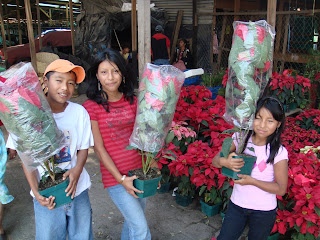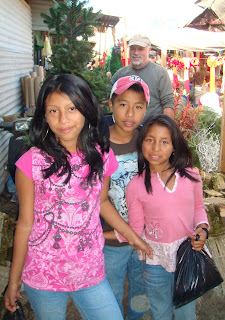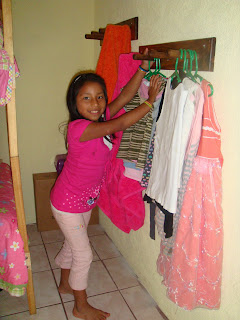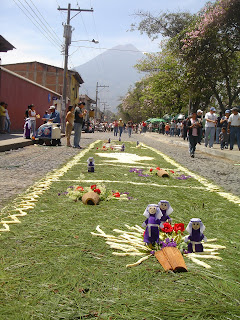





Christmas in Guatemala is a delightful melange of sounds, colors and smells. Fireworks, the kind that are very illegal in the US and only available to fire departments, are very popular and used for every kind of celebration. At Christmas time there is an entire market that sells nothing but "bombas" (the big ones) along with "cohetes." Last year a fire started and the entire market blew up within a few minutes. No one was hurt and the vendors were all back in business the next morning.
The official start of the season is a procession of children from the La Merced church. The children all wear "traje" or indigenous clothing. Astrid and Denis participated.
There are signs everywhere that say "Hay tamales" (we have tamales). Some are better than others but the locals celebrate the birth of Christ with tamales and fruit "ponche" (a little rum helps). Alex and Estela's children have decorated a potted pine tree hauled in from my garden. With some friends from California we went to the Christmas market which sells figures for "nacimientos" (nativity scenes), colored sawdust to embellish the nacimientos with roads, rivers and more and pine needles to put on the ground to welcome guests in the Mayan tradition. Though these kids have never had their own nacimiento before they knew exactly what t
 hey needed from Maria and Jose to the burro and the brick wrapping paper for the backing. Astrid kept looking longingly at the pitiful selection of Christmas trees. I, of course, capitulated. It was actually a nice, fresh looking and smelling tree with a good shape. On closer inspection we discovered that it had been "built" with the branches being nailed to the trunk. The kids didn't care and quickly picked out really tacky lights that play Jingle Bells and ornaments all the way from China. They couldn't wait to go home and set up their first Christmas tree which I understand is in the center of their tiny living room in all its glory.
hey needed from Maria and Jose to the burro and the brick wrapping paper for the backing. Astrid kept looking longingly at the pitiful selection of Christmas trees. I, of course, capitulated. It was actually a nice, fresh looking and smelling tree with a good shape. On closer inspection we discovered that it had been "built" with the branches being nailed to the trunk. The kids didn't care and quickly picked out really tacky lights that play Jingle Bells and ornaments all the way from China. They couldn't wait to go home and set up their first Christmas tree which I understand is in the center of their tiny living room in all its glory.This particular blog format does not allow for an easy integration of text and photos so I have just uploaded the photos in random order and will let them be where they lie. I trust that you can match up the text and the photos. The first of the Christmas miracles happened while driving through the pueblo of San Antonio Aguas Calientes where the house of Alex and Estela is. Alex and I were taking a donor to see the house. We were making our way down a crowded, narrow village street when I heard Alex say "look, the mother is dead." I looked and there was a tiny puppy sitting patiently next to the body of its mother who had very recently been hit by a car. Without another word Alex stopped the car, handed me a rag and I got out and picked up the pitiful pup who was otherwise being ignored by the locals because she was a female. At this writing "Tonya" (for San Antonio) is flourishing in my house and will soon have her immigration documents for travel to the US where she will be adopted. She will be living every Guatemalan's dream, that of flying to the US with papers.
Another miracle was that of getting the street gate changed at the house in San Antonio so that Alexander could secure his car at night. Out of concern for his only and most valuable asset Alexander has, for the last several months, been sleeping in his car in front of Pollo Campero (considered relatively safe as they have all night guards). He was only held up once at gunpoint but smiled his engaging, dimpled smile and told the would be robber that he had nothing, that he was just sleeping. The robber moved on in the hope of greener pastures. After his first full night sleeping at the new house Alexander grinned and said that he had slept until 8am. He was clearly pleased with himself and for the first time in his life, in from the street in his own home. He assured me that he was accustomed to living on the street but admitted that it was nice to have a place to call home. This, especially in view of a recent rash of violent attacks on taxis. Alex himself narrowly escaped an encounter with potential robbers (or worse) who had barricaded the road with rocks. Alex accelerated and drove over the rocks damaging the under carriage of his car and the would be assailants pelted the car with rocks breaking both the windshield and rear window. He has given up working at night except when called by someone he knows.
When I arrived early in December Alexander was doing a lot of work for a young man who was renting a house a few doors down. He was visiting with a friend and his disabled father from Cuernavaca, Mexico. Sergio had found Alex when he saw his car in front of my house with an "Obama Biden" bumper sticker on it. Alex has had a big grin most of this month because of multiple trips to the capital and also to Antigua restaurants with Sergio and company. When they returned to Mexico Sergio's friend who is the current president of the Rotary Club in Cuernavaca rewarded Alex with a bicycle for his children. Needless to say Alex was stunned and the children overjoyed.
Christmas Eve Estela brought me three tamales handmade by her mother. The children opened their gifts, tried out the bicycle and decided that "gringa" ponche was pretty good. They then went home to spend their first Noche Buena in their own home. Estela had enough tamales and ponche for the poor neighbors. I had contributed 5 pound bags of rice, beans, coffee, sugar and some Christmas goodies as "el senor" has no work, no way to feed all his kids. Estela contributed Incapurina (a nutritional supplement for malnourished children) and some of the children's vitamins I had given her and had wrapped some toys I had bought for the younger children. Sergio had provided Alex with bombas so they had a pretty perfect Christmas Eve. Estela reported that she hadn't gone to bed until 5am.
Antigua's New Year's Eve festivities start near the arch on 5th Avenida at about 4pm with multiple marimba bands followed by indigenous dancing and a lot more culminating with thirty minutes of fireworks at midnight. Let's hope that they signal the end to what has been a very dreary year and the start of something new. Happy New Year!





























